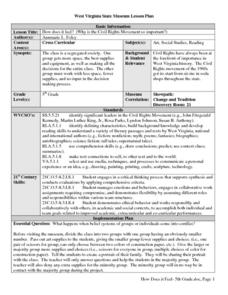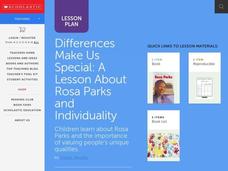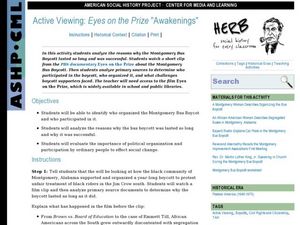Center for Civic Education
The Power of Nonviolence: What Is Nonviolence? What Does It Cost?
Your young learners will delve into the language of primary source documents in order to identify the characteristics, benefits, and costs of nonviolence. The instructional activity includes a mix of activities, including an anticipatory...
Curated OER
What are the Main Ideas?
Prior to beginning Rosa Parks: My Story by Rosa Parks, model for your class members how to determine the main idea of a text. Exercepts from another story are provided to use for the demonstration. The focus then shifts to Rosa Parks'...
Curated OER
How does it feel? Why is the Civil Rights Movement so Important?
Fifth graders study the Civil War. In this US history lesson, 5th graders simulate what life was like during the Civil War by having two groups with one group given more materials than the other group. Students then draw a portrait of...
Urbana School District
Knocking Down Fences
After reading The Other Side and guiding children through a picture walk, third graders investigate evidence of the civil rights movement. In the mini unit, 3rd graders analyze photographs of the past and make connections between...
Curated OER
An Experiment in Unfair Treatment/Prejudice
A rigged spelling bee gives class members a chance to experience some of the feelings associated with unfair treatment. Team one is given easy words while team two is given difficult words. As teams realize the unfairness the instructor...
Alabama Department of Archives and History
Montgomery Bus Boycott: We Would Rather Walk!
Have historians use primary sources to learn about the circumstances and implementation of the Montgomery Bus Boycott, and think about the issue of boycotts as a means of effecting social change. Wrap it up with a letter to the editor...
University of Arkansas
Individuals Making a Difference
The focus of this, the third in a five-activity unit study of human rights, is on individuals who made a difference. Billy Bowlegs, Dr. Sun Yat Sen, Fannie Lou Hamer, Michi Weglyn, and Yuri Koshiyama are some of the people class members...
Curated OER
Differences Make Us Special
Young scholars explore the similarities and differences among their classmates. They are introduced to the Civil Rights Movement-that all people be treated equally and fairly. Students discuss the importance of appreciating individual...
Curated OER
History Repeats Itself
Learners read about an event that occurred 140 years ago to ascertain
information (who? what? when? where? why?) and to compare this event to Rosa Parks arrest almost 50 years ago. They retell the story from your point of view.
Curated OER
People and Their Place in the Community
Third graders search TDC database for images of famous people, such as Rosa Parks, Gandhi, Martin Luther King Jr., etc. They also retrieve information about their accomplishments, time frames, areas, and how they made a difference in...
Curated OER
Breaking Barriers with Melba Pattillo
Young scholars are introduced to individuals who made the civil rights movement a success. They examine, analyze and interpret the events and people who had a significant and stirring impact on the course of history through stories,...
Curated OER
Montgomery Bus Boycott
Students investigate the Montgomery Bus Boycott. In this American Civil Rights Movement lesson, students determine whether or not they would have taken part in the boycott and write a 5 paragraph essay about the implications of partaking.
Curated OER
20th Century Civil Disobedience
Students write from varying perspectives in the American South about the civil rights movements in the 1950s. In this civics lesson, students view video clips and take notes. Students discuss the film and listen to a lecture on...
Curated OER
Evaluate Problem-Solving in the Context of Culture and Time-frame
Students examine literary elements in non-fiction literature. In this problem solving instructional activity, students read Rosa Parks, My Story and Beyond the Limits. Students make oral presentations based on the causes and effects,...
Curated OER
Historical Period
Young scholars identify and describe ways in which life was different in the time historical period of Rosa Parks. In this historical time period lesson plan, students explain that one characteristic of a biography is that it takes place...
Curated OER
Shapebooks: Rosa Parks
In this Rosa Parks worksheet, students read, color and construct a simple bus-shaped book about Rosa Parks. A reference web site for additional resources is given.
Curated OER
Active Viewing: Eyes on the Prize "Awakenings"
Dive deeper into the Montgomery Bus Boycott with this multi-stage lesson, centered on the essential question: Why did the boycott last so long? Historians investigate the Jim Crow south through a video clip (not included), then analyze...
Curated OER
Dear Mrs. Parks Teacher's Guide
Students read and respond to the book, Dear Mrs. Parks. In this African-American literature lesson plan, students read the text and examine several vocabulary words from the text. Students answer 11 discussion questions and participate...
Curated OER
African American Achievers
Students complete research projects. Students research the achievements of various African Americans and their contributions to the world. They use various resource links on the Internet to become more knowledgeable about the topic.
Common Core Sheets
Reading a Timeline
Sometimes the most important details of an informational text aren't within the text at all. Teach your class how to read timeline with a set of activities that prompts them to find specific dates and events on the timelines, as well as...
Curated OER
Right on Time!
Students read portions of biographies about human rights activists before participating in a jigsaw activity in which they report out on what they read. They made a timeline of one of the human rights activist's lives. They write a...
Curated OER
Martin Luther King, Jr.
Young scholars learn what goals Dr. Martin Luther King, Jr. had when he wanted to change the inequality of the United States.
Curated OER
The Power of Protest
Students explain how Rosa Parks refused to give up her bus seat to a white man. They discuss how her actions were heroic and how they affected the civil rights movement. They reflect on the lesson in journal entries.
K12 Reader
African American Freedom Fighters Word Search
An informative word search includes the names of six famous African American civil rights leaders. The list includes Rosa Parks, Sojourner Truth, Martin Luther King, Jr., Harriet Tubman, and Frederick Douglass.

























